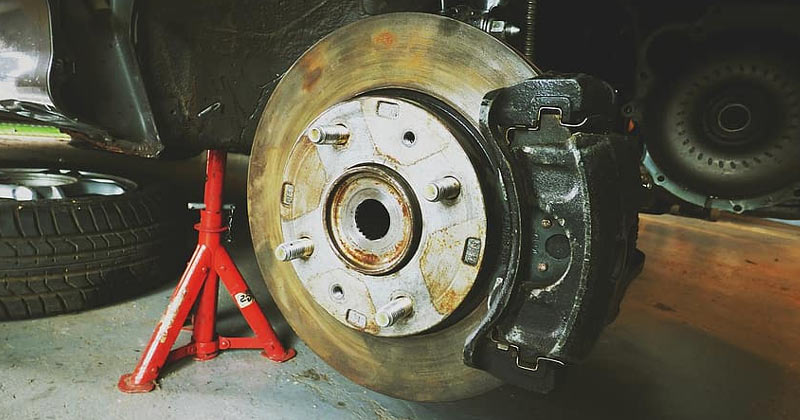Maintaining and repairing the brakes properly is only meant for professional mechanics. But every driver can tell that something is wrong with the brakes if you notice these few unmistakable clues. Here are a few signs of car brake problems indicating that your car brakes need service or replacement.

Those who regularly take their car to the workshop for inspection can save themselves some nasty surprises. But wear and tear or damage do not stick to appointments in the calendar. You should therefore check everything that serves your safety such as the steering, lights and tires at greater intervals. Do you hear suspicious noises? Do you feel unusual vibrations while driving? Or do you notice changes in the function? Particular attention should be paid to the brakes.
Here are the warning signs from your car brakes.
1. Loud Squeaking Noise – Car Brake Problems Signs
Do you hear a loud squeaking noise when braking? Then it must be the brake pads that are worn out. This increases the braking distance and can lead to problems with the brake discs or brake drums with use. Make sure you have the pads replaced in good time.
2. Vibrations
Vibrations also strongly indicate problems with the brakes. Small components can easily be worn out and must be replaced in due time.
3. Change in Pressure Points – Signs of Car Brake Problems
3.If the pressure point of the brake pedal changes, things can get really dangerous. If you do not visit a workshop, you risk your own safety and that of other road users. Besides, other components can break, which can result in high follow-up costs. This damage is noticeable at the latest during the main inspection and must then be repaired at all costs. It is also financially worthwhile to prevent these problems.

Suggested Read: Fogged Windows – This is How You Can Get a Clear View
4. Spongy Brake Pedal & Bubbles in Brake Fluid
Is the brake pedal spongy and are there bubbles in the brake fluid(in a reservoir in the engine compartment)? Then the brake system could be filled with air and must be emptied and refilled with new brake oil. Only trained hands should do this work.
5. Brake Fluid Leakage
Depress the brake pedal for 30 seconds. If you can push the brake pedal almost to the base without resistance, the brake fluid may be leaking as the braking force is not being transferred sufficiently to the brakes. In this case, drive slowly like at a third less than the permitted speed and go straight to the nearest workshop. If the brake pedal can be pressed all the way down, do not drive but have the vehicle towed.
A short safety check can be conducted on the stationary car to show whether the brakes are working properly. To do this, step on the brake pedal and check the distance the car travels till which the brake does not react. This distance should not be more than two to three centimeters. If it is more than that, contact the mechanic immediately.

Replace Black Brake Fluid – Car Care Tips
The color of the brake fluid also indicates how hard the brakes can still grip. Ideally, the liquid should be honey to amber in color. If it is dark or even black, the liquid must be replaced.
Full Braking Against Rust on the Brake Discs
Corrosion on the brake discs is completely normal and not necessarily a safety problem, as the rust is regularly scraped down. However, especially the brakes on the front axle, as the rear brake discs are much less stressed when braking carefully.
If these rust pimples or rust scars have already formed here, you should visit a workshop. To prevent this corrosion, brake hard at regular and for larger intervals. Make sure, however, that you do not endanger other road users under any circumstances. An empty parking lot, for example, is well suited for this.
Suggested Read: How to Bring the Shine Back to the Car Paint Yourself?
When to Change the Brake Pad and Disc
When would the parts of the braking system need replacement, does not depend on the mileage, but rather on driving style, load or defects. That is why regular checks are important. A decrease in the braking effect, noises such as squeaking or dragging, and increasing free travel of the brake pedal are some warning signs of car brake problems from the degrading brakes.


